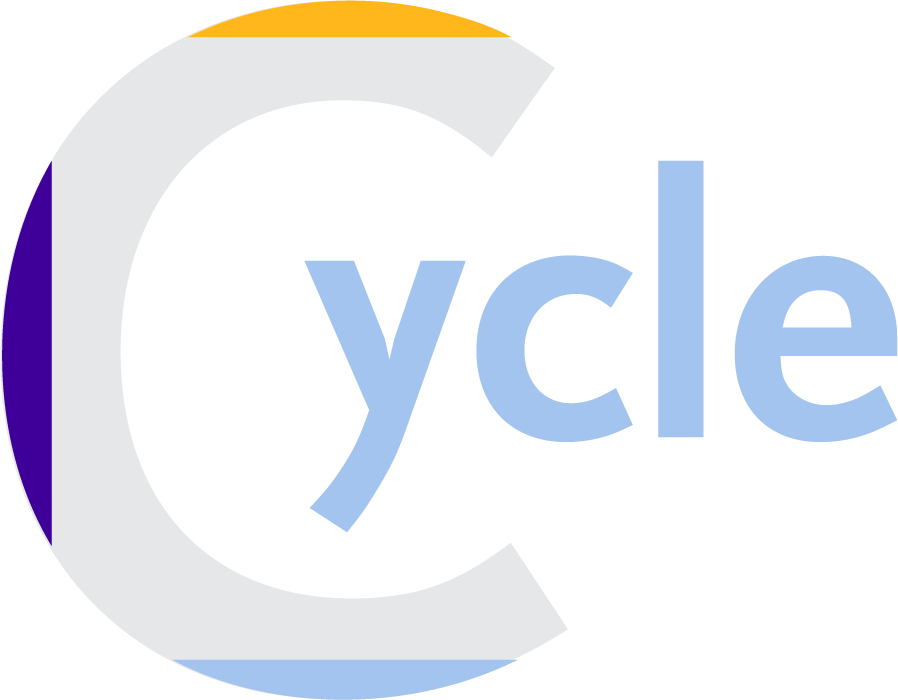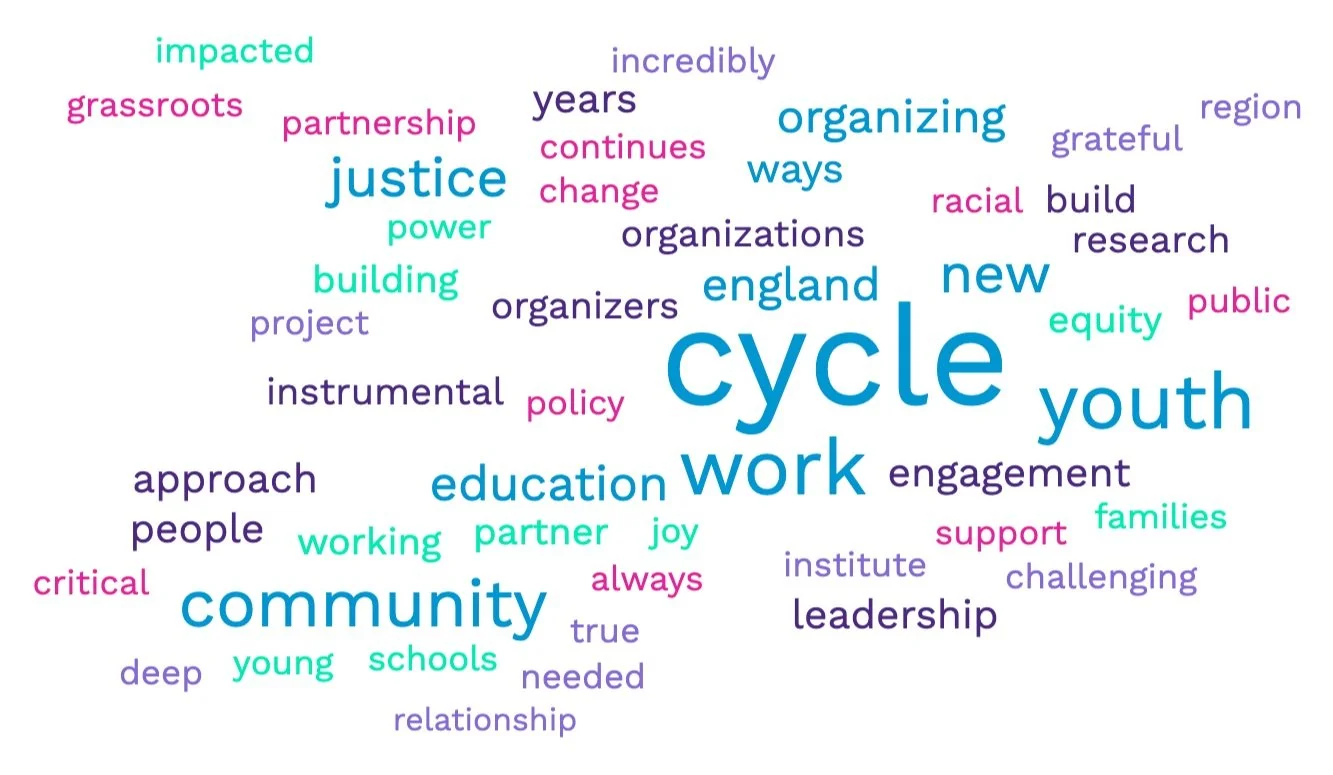CYCLE Turns 5!
Five years ago, seven of us committed to continuing the work we had started at the Annenberg Institute for School Reform were in search of a new home for our New England-based community-engaged programs and research. Together we formed the Center for Youth & Community Leadership in Education (CYCLE) and landed at Roger Williams University (RWU). We are proud of what we have accomplished in the past five years and recently asked a few of our partners to reflect on the ways in which CYCLE has impacted them, their work, and the field. Their generous responses (which you can read here) were both humbling and inspiring.
To say that we launched CYCLE with a sense of certainty would be an overstatement. In fact, while we believed deeply in our work with youth, families, and educators, it was not clear that we would be able to sustain ourselves in a new organizational setting. Our first year was purely about maintaining our existing projects and work during our transition to RWU. In year two we were awarded new grants and contracts that helped us gain some footing. Then, just as we were planning to step back and think critically about our future and ways to deepen our strategies for change, the COVID-19 pandemic shifted us back into a new sense of uncertainty. Over the next two years, our energy went to into supporting our partners in the context of the pandemic, rethinking our programs to be responsive to this new context, and ensuring that we were doing what we could to protect our team’s health and safety. And, somehow, CYCLE thrived as an organization. We grew from 8 full-time staff to 12. We restructured to distribute leadership across our program areas. We developed new projects and evolved some of our older ones. We moved into new office spaces (twice!), albeit in the same building. And, in this past year as we foreshadowed in last year’s birthday post, we finally found the space for some strategic planning.
As a result of our strategic planning process, CYCLE has a refreshed mission, vision, and set of values. We have further clarified how our approach to the work we do is grounded in a belief in the theory, practice, and power of community organizing. And, we have set our focus on three key strategic priorities that we believe will support and deepen CYCLE’s role in the broader fight for educational justice. In honor of our 5th birthday, we are excited to share each of these outcomes of our strategic planning process.
Mission
CYCLE partners with youth, families, educators, and other stakeholders to build collective power and fight for educational justice.
Building the schools our communities deserve requires collective power derived from shared leadership and trusting relationships between youth, families, and educators. Educational justice requires the prioritization of the needs, vision, and influence of those most impacted by the lack of democracy, dollars, and dignity in our current public education system—namely, youth and families of color, low-income communities, and oftentimes frontline educators and school staff.
Vision
We envision a future when public schools are centers of strength for the communities they’re in.
What doe this vision mean? To us, it means that more than just places to learn facts and academic skills, schools are resourced well and equitably to be safe, supportive, open spaces for change, growth, and connection. Youth and families feel a sense of belonging and ownership in and for their schools. Youth have ready, equitable access to the supports they need to succeed in school, with those academic, social-emotional, language, cultural, and other developmental supports and considerations seen as essential, core elements to a responsive education. Community wellbeing and an affirming school culture are recognized as central and prerequisite to student success, and are considered with equal weight to academic pursuits and outcomes. Youth see themselves, their histories, and their lived experiences valued and reflected in the staff, faculty, curriculum, and activities in their schools. Educators and school leaders recognize and embrace the knowledge and assets that youth, families, and their surrounding communities bring to schools. Youth, families, educators, and other community members work in solidarity to make classroom, building, and district level decisions. Public education is respected and upheld as a process and space to provide relevant information, tools, access, resources, support, and relationships to learn about, critique, and work to create just communities.
Values
Liberation. We believe education should equip communities to recognize and challenge injustice and oppression, and use their collective power and creativity to build a world in which we are all free.
Collective Power. We value building power among those historically marginalized and excluded from decision-making to disrupt traditional power structures and effect long-term, systemic change.
Curiosity & Humility. We value a culture of inquiry, reflection, and risk-taking, and strive to learn in partnership with communities.
Agency & Voice. We believe the perspectives and leadership of people most excluded, marginalized, and harmed by an issue must be at the center of finding and implementing solutions.
Joy & Connection. We cultivate community care and are energized by creating spaces that allow and encourage us to connect as whole humans, develop relationships, and embrace celebration.
Transparency & Accountability. We are accountable to our employees, partners and community, and strive to move in ways that reflect our values. CYCLE will act with honesty and integrity, and will be transparent about our decision-making, processes, and impacts.
Approach
At its core, CYCLE’s work is aimed at connecting schools and communities so that young people are nurtured to learn and thrive, families are engaged as educational partners, and communities find strength in the schools that serve them. To do this work, we turn to the theories and practices of community organizing to lay the foundation for our approach to any project. For us, that translates to three key principles we strive to keep in mind when developing our work:
Relationships. We seek to build relationships that are purposeful because we know that we don’t live single issue lives and no single entity can create positive change alone.
Grassroots leadership. Those who are most impacted by social problems are the ones who should be at the center of determining solutions.
Shared analysis. To work together to solve the problems our communities face, we must develop a shared understanding of those problems and their root causes.
Whether our work is directly engaging in organizing campaigns, doing community-driven research, or convening partners to learn and build with each other, we seek to develop relationships, grassroots leadership, and shared analysis to build collective power and fight for educational justice.
Strategic Priorities
In pursuit of our mission and vision, and in alignment with our values and approach, we have set three strategic priorities for the upcoming 3-5 years. We will be working with intention in the coming months to position each of our projects and programs within these priorities.
Building Leadership, Knowledge & Power. CYCLE will support individuals and organizations in enhancing skills and knowledge, accessing tools and resources, and defining community challenges and solutions. We will center those in the margins and serve as a partner, bridge, and process/content expert.
Influencing Analysis, Policy & Practice. CYCLE will deepen the practice of shared analysis, develop and sustain community connections among field partners, and influence changes in policy and practice for education justice.
Striving for Operational Excellence. CYCLE will live into its mission and vision, operating consistently with our values internally and externally. We will intentionally develop our work in ways that emphasize transparency, equity, and professional growth.
Thank You!
Strategic planning processes are often difficult. Add the realities of trying to them almost entirely over Zoom while still attending to your otherwise very full-time responsibilities and they become even harder. We could not have done this work and generated the thinking evident in the words we have shared above (plus the more detailed plans we’ve got underneath them) without the steady facilitation and support of our strategic planning consultant Michelle Duso. Additionally, Michelle engaged many of our partners in thoughtful discussions that offered us incredible insight and support when thinking about CYCLE’s future. As we enter our sixth year, we are so very grateful and thankful to everyone who contributed to our process and more broadly to those who consider us a partner and co-conspirator in our collective work. Here’s to the next 5 years!




